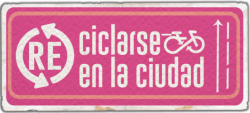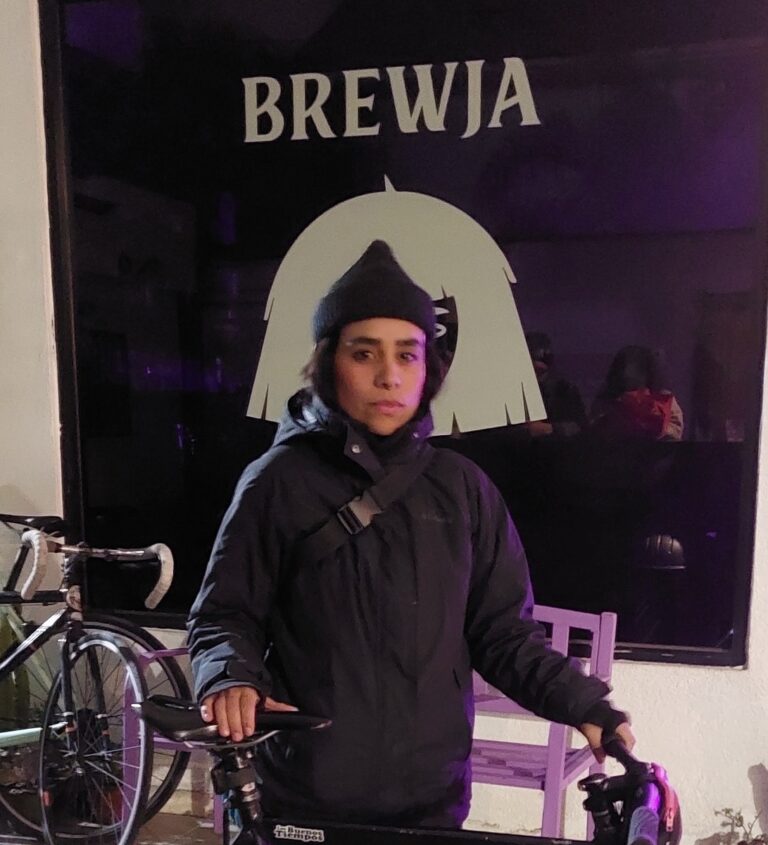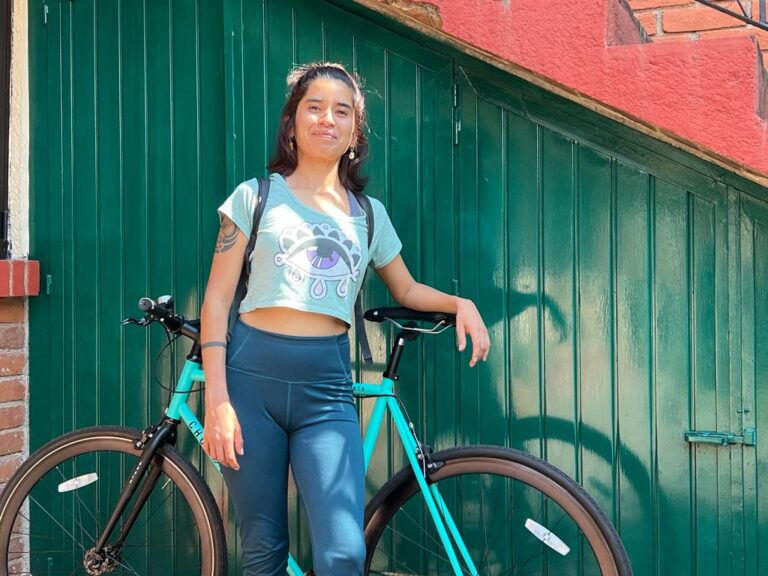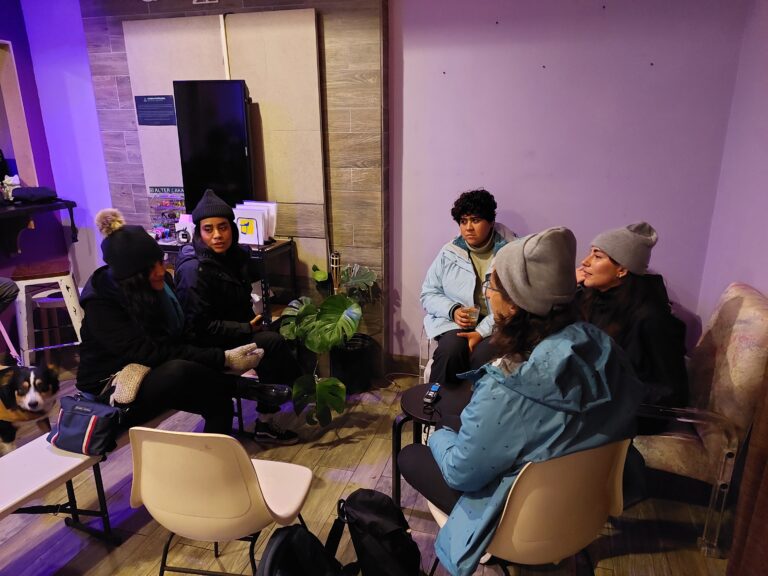Jamil Márquez
Know That You Are Not Alone
Taking up biking again gave me a group of friends and a new way of experiencing life in all these places. It reminded me of who I have always been and who I had ceased to be for a while: a daring woman, without fear, who feels strong.
Café Chepiche, Oaxaca, Oax. July 15, 2019. Vixi Escuela is in front of a small, paved park in the Reforma neighbourhood, between the Oaxaca beltway and the grey water canal, facing a Pemex gas station. Vixi means "sweet" in Mixtec. You'd think that all this collective does is teach the children of Oaxaca how to ride a bike. But in reality, their activities, taken as a whole, constitute a workshop about civic responsibilities in the broadest sense. The activities constitute a workshop that teaches one how to learn how to live and be among others. They place a focus on gender, the environment, sustainable mobility, and inclusivity. Bicycles are the fundamental instrument of this citizen-oriented pedagogy. First off, members apologize to society. At the entrance to the premises, behind the jumble of donated bicycles that the collective repairs for its workshops, there is a sign that reads: "Sorry for the inconvenience, we are improving the world." This is where we first spoke with Jamil, and the next day we met at Café Chepiche.
I have a diverse background. I'm from the Isthmus of Tehuantepec, from here in Oaxaca, from Tuxtepec, and also from Puebla on my mother's side - although I was born in The Valley of Mexico. I would say I'm a mix of several cultures. I'm a psychologist by profession; I'm a feminist; I love the mountains; I love exercising. I've exercised my whole life. I'd say I am daring. I've worked for the Secretariat of Health for eleven years. I currently work in health advocacy, where I hold workshops for all kinds of people: children, adolescents, and the elderly. I help them develop tools to take care of their health and improve their quality of life. I am also the health sector's community liaison. For the last year and a half, I've also worked in private practice, and I am finishing a master's degree in Ericksonian Hypnosis and Brief Psychotherapy.
I spent my childhood playing soccer in the street, riding my bike, and climbing trees. My house had a mango orchard that was like my safe haven. Whenever I got angry or sad, I'd climb a sturdy tree. I remember one time I had just seen a film about motorcycle stunt riding, and where we lived, they were just about to pave the street. They were digging a hole for the water supply outside my house, and I said, well, I'll put up a board, and then I can jump over it on a bicycle. So off I went! I was riding my bike, and the front tire got stuck in the maintenance hole, the handlebars in my stomach, and I came to a sudden stop. I mean, of course, life is not like the movies.
During my childhood, there were happy moments and not-so-happy moments. But, well, as always, I don't know if it's because of stubbornness or what, but I've always tried to make the best of things. Or maybe sometimes it's a kind of coping method - or I don't like to feel bad. I don't know... I think the best part of my life was my adolescence. I've always played sports, and ever since I was little, I've done gymnastics, karate, and taekwondo. Then, later, I took up basketball, track and field, and soccer. In high school, I did track and field, and I was good at it. Well, not that good, but I ran well and competed in a lot of sprint races. My main events were the 100- and 200-meter dashes. Yeah, my adolescence was great; it was the best. Although, it had its fair share of sadness too. My parents got divorced around my first year of high school. But it helped me to feel that my body was strong because we are all biopsychosocial; our health is connected to our environment. I'm sure we're all connected in many ways. Exercise helped me to get a lot of my emotions out too. All my life, exercise has helped me cope with sad situations.
Besides, I had nothing to lose. I felt like I had already done all the things I wanted to do in my life, and dying didn't scare me, you know? I knew that if I were to die, I wouldn't be afraid.
In 2016, I was diagnosed with breast cancer. That was the biggest shock of my life to date. At the time, I didn't know anyone who had cancer. I’m the first woman in my family to have it. Reality kicked in, and I thought again that my body was strong, that it was going to help me. The good news is that it was caught early. I remember the doctor told me that I needed a biopsy and to come in the next morning at seven o'clock before she started her consultations. That's when I realized it was serious. I spoke to Pascal, and we went the next day. It was a Saturday morning. A week went by, and they called me to tell me that the results were in. In July, there’s a bike race from Oaxaca to Puerto Escondido, and I wanted to participate because Pascal had already done the whole thing. I told him: "Hey, let's do it in relays! I'm not going to get the results until I get back from the race." And off we went, just like that, cycling in relays. I finished the race. I was very happy with myself for having finished that race and for having done it as a team with Pas. When we got back, I told Pas, "Let's go get those results." The doctor informed me that she had detected breast cancer. I thought to myself, "Well, now what?" But she told me, "Don't worry, just try and keep yourself busy." And that snapped me back into reality. I said, "OK, I've got this." "Get down to business," the doctor told me.
We didn't tell anyone. Pascal and I kept it to ourselves. "We will do it on our own," I told him. I wanted to tell my family, but I felt that if I told them at that moment, they would cry and be devastated, which would have made me lose it. They'd also have asked me things like, "What's going to happen?" and I wanted answers first. So, I started to plan my next move: find out who I had to meet with and what I had to do. When I knew when I was going to have the operation and what they were going to do, I told my mom and my sister. "I have something to say. I have cancer. They found cancer - but don't worry, I'm going to have the operation on this day; I already know where; I already know everything." We had it all planned out. I also told them to be there for Pascal because he wasn't going to be able to get through everything on his own. He was going to need their support. And it went the same with all my friends: "Don't worry, I've got this. Everything is going to be fine." That helped me - having it all figured out before telling everybody.
I think there were a lot of emotions that I had to deal with to work through everything. For example, I thought, "The tumor is also something that I am going to get out. It will no longer be inside of me; I'll be able to touch it, call it by its name, and no longer keep it inside." In fact, at some point, I said to myself: "Cancer is 'healing.' There's something I have to heal." I think that helped me too. Besides, I had nothing to lose. I felt like I had already done all the things I wanted to do in my life, and dying didn't scare me, you know? I knew that if I were to die, I wouldn't be afraid. I said to myself, "I'm going to give it my all and do everything in my power to get better. And if I can't, I'm not going to feel bad about it either because I've done so many things I've wanted to."
During the treatment process, riding my bike helped a lot because I had to go to a lot of meetings and those bike rides were like a break from everything that was happening to me. I would put on my neck warmer, and nobody could tell that I was a woman on my bike. Plus, it helped me feel strong. My bike also brought me closer to Pascal, who was always by my side. That's something I'm grateful to him for. He would stay with me in the hospital; he came with me to all of my chemotherapy sessions. I am so grateful for that and for all my support network.
I learned to ride a bike in El Llano. My dad taught me. "You pedal, and I'll push you to see how far you go," he used to tell me. I fell a lot. Now, of course, there are other ways. But with my dad, it was "Go and don't fall, and if you fall down, get back up." I was about six or seven years old, but I don't remember being afraid. I had a pink bike, but it was stolen. I didn't get another until I was 26.
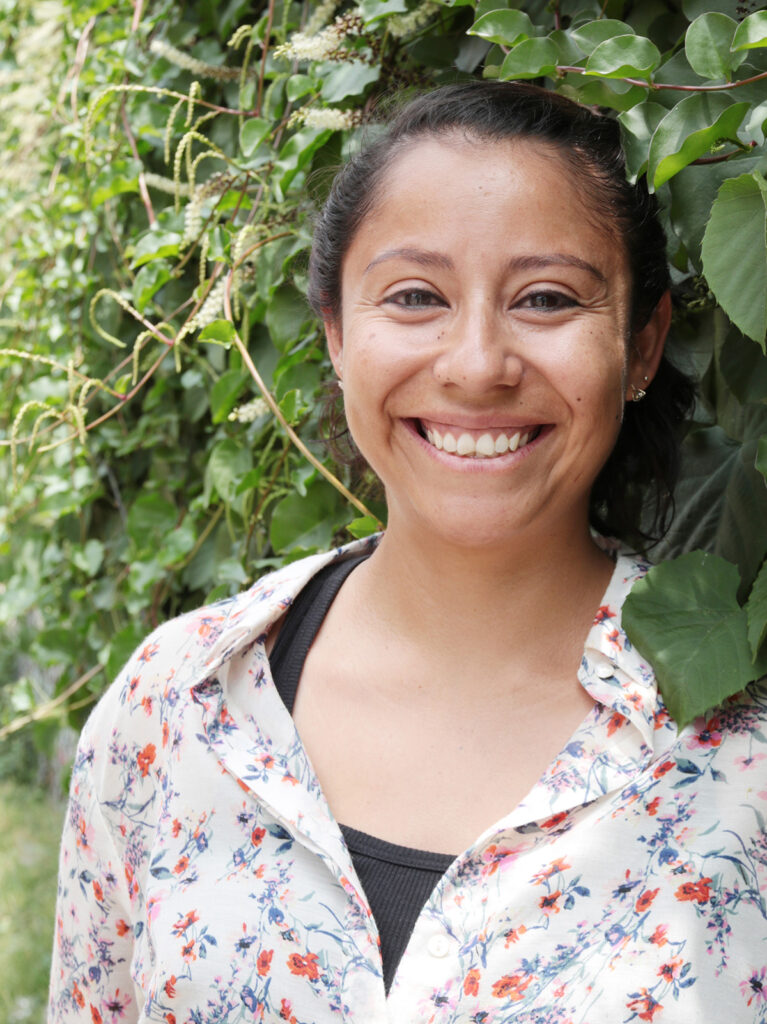
Thanks to my experience, I understand cycling as an activity of community and love - of good vibes.
I had a boyfriend who I loved very much, and we shared a group of friends. We broke up, and that was it; I was left with no boyfriend and no friends. I remember thinking, "Now what am I going to do?" Back then, I had a best friend who had my back. Her name was Bedani. She talked to me about sorority, about love between sisters, and about not losing ourselves in love. That's when I learned about feminism. I met another friend through her, Walter - and through him another friend, Tere, who would call me to go out. She'd say, "Come on! Let's go out dancing!"
She invited me to a dance group. That's where I met Arlet and Jessi, who were also in a bicycle group. They invited the whole dance group to a bike meet. I remember thinking to myself that it had been a while since I rode a bike, but then thinking, "Who cares, let's do it." We rented a bike, and it was the best ride I could have asked for! I was still a little depressed about my boyfriend and my friends, but that's when I was truly able to find my own group of friends - riding my bicycle. We went to Tule and had a blast. We rode on the side of the expressway, and, since it had just rained that day, we all got muddy and wrapped our socks around our handlebars... it was a wonderful ride! From then on, I decided to go biking every Sunday. The bike group was called "Nitos," and I never missed a meet. It wasn't even hard for me to get up early on Sundays. I became the group leader, and I organised rides and a few events. I made some really good friends there. We'd all go out biking together, and everyone would bring food, or we'd eat in the places we visited. We would go to the towns near Oaxaca - to Tule, Tlacolula, and a bunch of other places. I thought to myself, "Oaxaca is so beautiful!" I'd never felt like that before. There were so many places, and all so close by. Although, in the beginning, before you think about it relative to a bike, you don't realize it. You probably say to yourself something like, "Forty-two kilometres! Am I going to make it forty-two kilometres?" But in the end, you don't even notice. You know you can make it, and with the supportive group atmosphere, you enjoy it even more. Nitos is a recreational group, not a competitive one. So, if someone wasn't able to keep pedaling, we pushed them. If someone was lagging behind, we slowed down the pace.
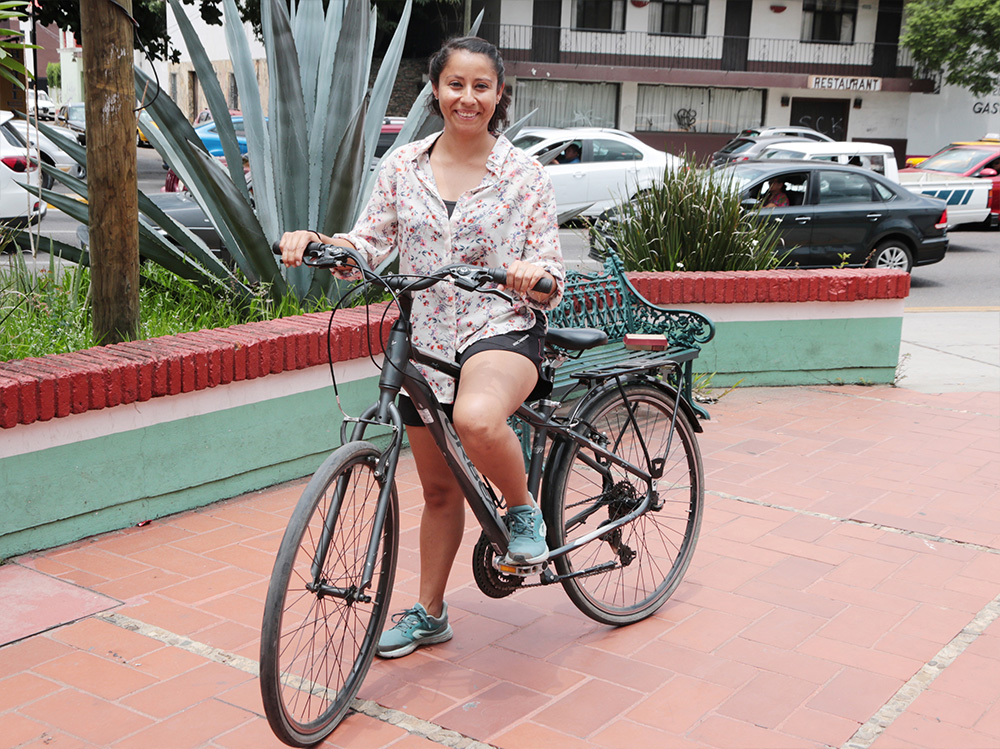
Everyone helps you; they wait for you. All of a sudden, you're there and say, "I can't believe it!" That's how we started forming a close-knit group of friends, and I began to discover my surroundings, moving beyond how I saw and experienced them before cycling. Taking up biking again gave me a group of friends and a new way of experiencing life in all these places. It reminded me of who I have always been and who I had ceased to be for a while: a daring woman, without fear, who feels strong and capable of enduring fatigue and mentally pushing myself. "Just a little bit more, just a little further, just until I reach that tree, and then the next one," and so on; enduring, enduring, until, "OK; I made it this far, I made it, I can't believe it." Without all that, cancer - or anything similar would be very difficult. The bike really helped me find myself, my capacities, and my limits. It also taught me that you're not alone, that if you get tired, people will help you; if there's a problem, there's a group of people who are there for you.
Thanks to my experience, I understand cycling as an activity of community and love - of good vibes. For example, if I'm cycling in the city and I meet another person on a bike, it's very easy to say, "Hey, how's it going?” They'll respond, "Hey, what's up?" and we go our separate ways. I don't even know them, and it comes naturally. If you're in a car, you don't notice people at all. You're in a bubble. I've also participated in competitions. There are some people who are there to win, but there are also many who go just for the fun of it, for the ride. And, if someone gets a flat, multiple people will get off their bikes and help. Or, if you fall, you'll always hear, "Hey, are you OK?" - "Yes, yes, I’m OK." Or, if someone can't go on, you'll push them. With bikes, there's this duality of being able to ride in a group and alone at the same time. I tend to think a lot, all the time. That's just me. But when I'm on a bike, my mind goes quiet. I no longer need to think about everything. Instead, I let myself feel: feel my body, feel what is happening to it. I take in my enviornnment, the colour, people, the air; I am more in touch with myself. I allow myself to be happier. When you drive a car, you have traffic, gears, heat, and rushing. You know you can accelerate to get there quickly, but the reality is, you can't accelerate because of the traffic. You become frustrated; you get angry. In public transport, you are always dependent on someone else. Like the driver: if he wants to wait for half an hour while there is a fare, or if he is racing someone else. And then there is security. As a woman, you get harassed. You have to go through some sketchy areas to take the bus; you can't pick your route. On a bike, if there's a road block, it's not a big deal; you can stop wherever you want without the stress of parking. You can better manage your time.
I think it's important to take a gendered approach to cycling, because I've come to realise that women have different needs, and it's important to understand them.
I think it's important to take a gendered approach to cycling, because I've come to realise that women have different needs, and it's important to understand them. At Vixi, when we teach girls, we have to start by showing them they can develop skills the exact same as boys can and that if they want to, they can ride a bike, climb a tree or do anything they want. I always tell the girls, "Look, Lucy is a champion cyclist; Lucy is very strong," and the girls will respond, "Really?" When there is someone like you who can do things, you say, "Hey, I can too" - not thinking about it in terms of competition, but rather in terms of admiration. You want to achieve things that women can, just the same as men. This comes from a culture that we have internalised. For example, when we teach basic mechanics, the boys are already comfortable. They pick up a pair of pliers or a screwdriver - or any other tool with confidence, and they speak with confidence too. The girls don't speak up because they aren't familiar with mechanics, despite the fact that, at that point, no one really knows anything yet - not the boys or the girls.
First, we have to show them that they have the ability, that the tools are for them. We have to listen to them so they see that they can break the cultural barriers that have been ingrained in us. And then, we have to start teaching girls, starting from those cultural and mental limits. That's why it's important to have workshops just for girls, where they feel safe and can identify with other women. And the truth is, they learn super-fast - sometimes faster than the boys. You just have to give them the tools. Literally, the tools!
Redes y contacto de Jamil Márquez
Share this story
Colaboradores
Entrevista: Alejandro Zamora
Revisión: María Ávila, Hannah Wilson
Fotografía: Itzel Ávila
